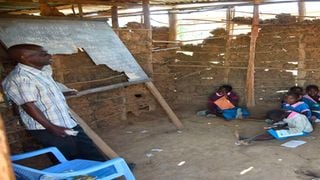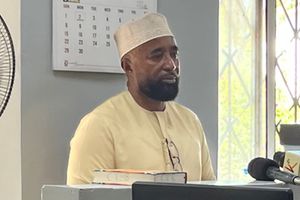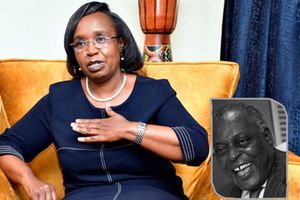
An ongoing lesson at Mukangu Primary School in Matete, Kakamega County, on September 24,
Education
Premium
State to pay fees for 20,000 poor secondary school learners
More than 20,000 needy secondary school students will have their fees paid from Sh400 million released by the government under the presidential bursary programme.
The cash was released to schools at the weekend after successful applicants sent their requests through their respective constituency offices that administer the scheme.
The funds are part of the Sh8.95 billion released by the government to benefit vulnerable populations under the cash transfer programme.
The funds are meant to educate orphans and vulnerable children under a bursary scheme started in 2013.
Announcing the release of the funds, Special Programmes Cabinet Secretary Margaret Kobia said the aim of the bursary is to enhance secondary school access, class attendance and completion.
“Disbursement of this fund is constituency based, with all constituencies getting an equal allocation of Sh1.3 million,” Prof Kobia said in a statement.
Through the programme, a total of 22,000 needy and orphaned students in public boarding schools will have their fees paid to a maximum of Sh30,000 per learner in the 2021/22 financial year.
The government is currently paying Sh22,444 per student under the free-day secondary school education programme.
Parents in boarding schools are required to pay the balance as per the Education ministry’s fees guidelines to schools.
In national schools, parents are required to pay Sh53,554 per year while those with children in Category B boarding and extra county schools cough up Sh40,535.
Due to economic hardships caused by Covid-19 pandemic, the Education ministry reduced the fees to Sh45,000 for national schools while extra county and Category B boarding schools will pay Sh35,000.
Further, the government, through the Ministry of Education- Elimu Scholarship Programme is sponsoring 9,000 Form One students every year.
The programmes targets bright but needy students in 110 sub-counties and 15 urban centres with informal settlements.
Last year, the allocation was affirmatively increased in urban centres with slums from 25 percent to 33.3 percent of the 9,000 slots to cushion vulnerable households and give hope to the less fortunate.
More students are also receiving support through the Jomo Kenyatta Foundation, Kenya Commercial Bank, Equity Bank scholarship programmes among others.
The National Government Constituency Development Fund (NG-CDF) is also offering bursaries to needy students across the country
Prof Kobia has also announced that of the Sh8.9 billion released, Sh8.5 billion will support the most vulnerable members of the society under the Inua Jamii programme.
The money is meant to cushion orphans and vulnerable children, older persons and persons with severe disabilities from poverty, hunger and improve their lives.
Some Sh13.045 million has been disbursed for nutrition support through cash and health education programme.
“The niche programme targets households with children under two years of age and pregnant and lactating mothers who are already enrolled in the Inua Jamii programme,” said Prof Kobia.
Under this programme, a total of 339,15 households will benefit from the money depending on the number of children enrolled in the programme.
The households are in Kitui, Kilifi, Marsabit, Turkana and West Pokot counties.
Prof Kobia said the funds have been credited to 1,067,805 Inua Jamii beneficiaries with payments expected to start last week.
Each of the beneficiaries will receive Sh8, 000 being payment of July, August, September and October 2021.
“Beneficiaries or caregivers can access all or part of this payment at any time over a six months’ period. This will avoid crowding at the payment points,” said Prof Kobia.





